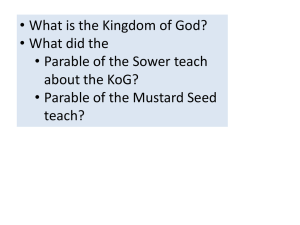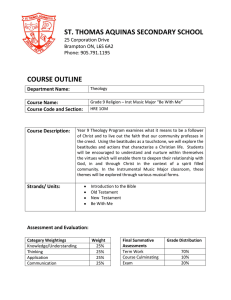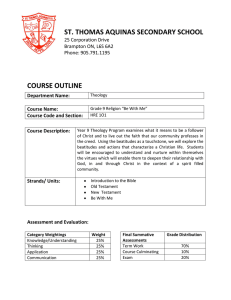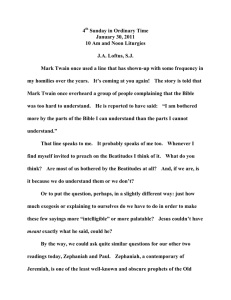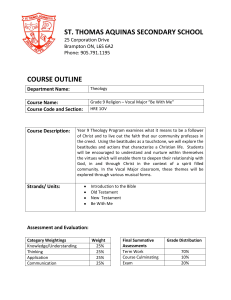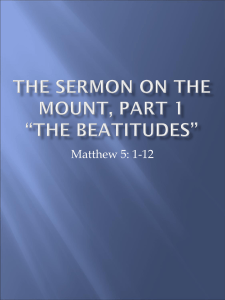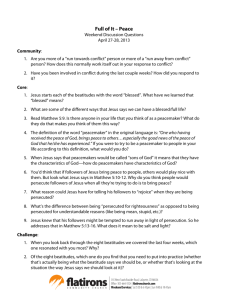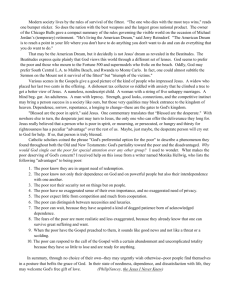Document 14396644
advertisement
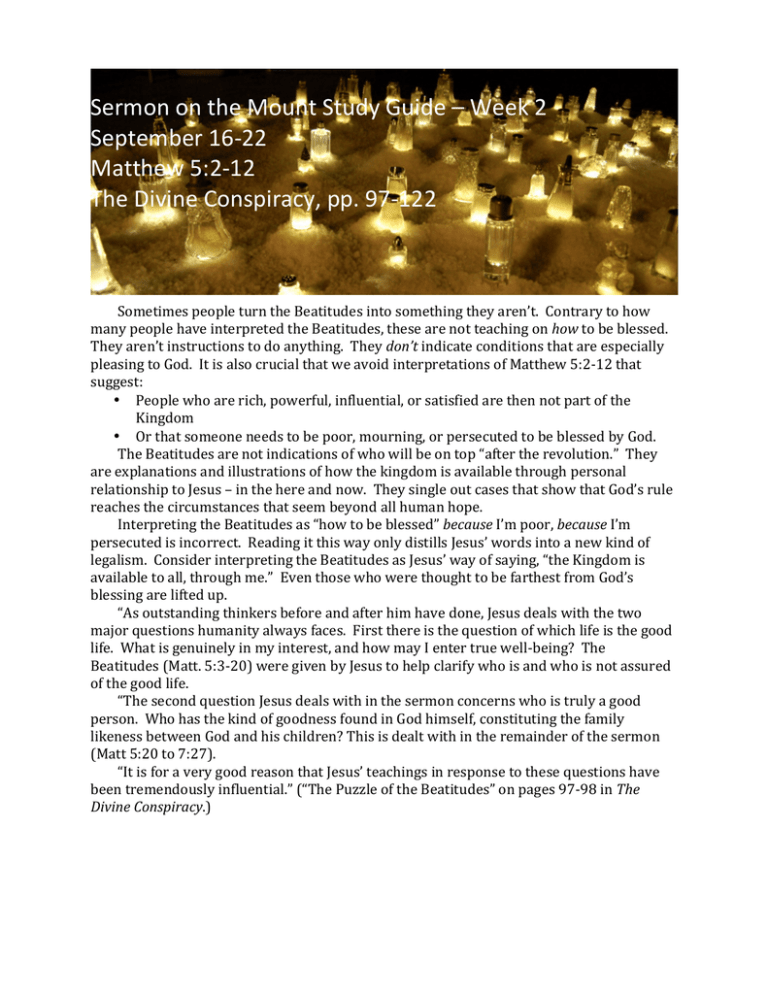
Sermon on the Mount Study Guide – Week 2 September 16-­‐22 Matthew 5:2-­‐12 The Divine Conspiracy, pp. 97-­‐122 Sometimes people turn the Beatitudes into something they aren’t. Contrary to how many people have interpreted the Beatitudes, these are not teaching on how to be blessed. They aren’t instructions to do anything. They don’t indicate conditions that are especially pleasing to God. It is also crucial that we avoid interpretations of Matthew 5:2-­‐12 that suggest: • People who are rich, powerful, influential, or satisfied are then not part of the Kingdom • Or that someone needs to be poor, mourning, or persecuted to be blessed by God. The Beatitudes are not indications of who will be on top “after the revolution.” They are explanations and illustrations of how the kingdom is available through personal relationship to Jesus – in the here and now. They single out cases that show that God’s rule reaches the circumstances that seem beyond all human hope. Interpreting the Beatitudes as “how to be blessed” because I’m poor, because I’m persecuted is incorrect. Reading it this way only distills Jesus’ words into a new kind of legalism. Consider interpreting the Beatitudes as Jesus’ way of saying, “the Kingdom is available to all, through me.” Even those who were thought to be farthest from God’s blessing are lifted up. “As outstanding thinkers before and after him have done, Jesus deals with the two major questions humanity always faces. First there is the question of which life is the good life. What is genuinely in my interest, and how may I enter true well-­‐being? The Beatitudes (Matt. 5:3-­‐20) were given by Jesus to help clarify who is and who is not assured of the good life. “The second question Jesus deals with in the sermon concerns who is truly a good person. Who has the kind of goodness found in God himself, constituting the family likeness between God and his children? This is dealt with in the remainder of the sermon (Matt 5:20 to 7:27). “It is for a very good reason that Jesus’ teachings in response to these questions have been tremendously influential.” (“The Puzzle of the Beatitudes” on pages 97-­‐98 in The Divine Conspiracy.) Discussing the Text: 1. Consider that what Jesus taught in the Beatitudes was a clarification of the way he lived life – emphasizing the availability of the Kingdom of God. a. Discuss how the Beatitudes describe the Kingdom of God. b. Does the Kingdom seem available here and now? 2. Sometimes verses 11-­‐12 have been used as a justification for passivity in the face of Christian persecution. Should we accept persecution without resistance? How does Dallas Willard interpret the Beatitudes to argue against such acceptance? (See summary) 3. Jesus’ teaching isn’t something terribly new. The Old Testament tells the story first: the Kingdom is for the outsider – the non-­‐Israelite (read 1 Kings 17); and the Kingdom is for the insider – those who have it all, or think they have it all (read 2 Kings 4:11-­‐13). The Kingdom is for all, insider and outsider, rich and poor. Discussing the World: 1. Dallas Willard helps us think about the Beatitudes today by writing: “Blessed are the physically repulsive, Blessed are those who smell bad, The twisted, misshapen, deformed, The too big, too little, too loud, The bald, the fat, and the old – For they are all riotously celebrated in the party of Jesus” (123) a. Who do we normally exclude from “the party of Jesus”? Who else might we add to the list? What does this mean about the nature of the Kingdom of God? 2. The Beatitudes are a list of human “lasts” to whom heaven reaches down and makes divine “firsts.” So the gospel tells of a kingdom where no one is beyond blessing. How does being made in God’s image help us understand the Kingdom of God? How are we to extend blessing to those we meet? Action: The suggested Spiritual Discipline this week is Celebration! • The purpose of celebration is to take joyful, passionate pleasure in God. • Gratefully give and share all you are and have (whether that is much or little) as a sign of your thankfulness to God. • Live from a mentality of abundance rather than scarcity • Free yourself from the addiction of criticism or negativity
